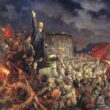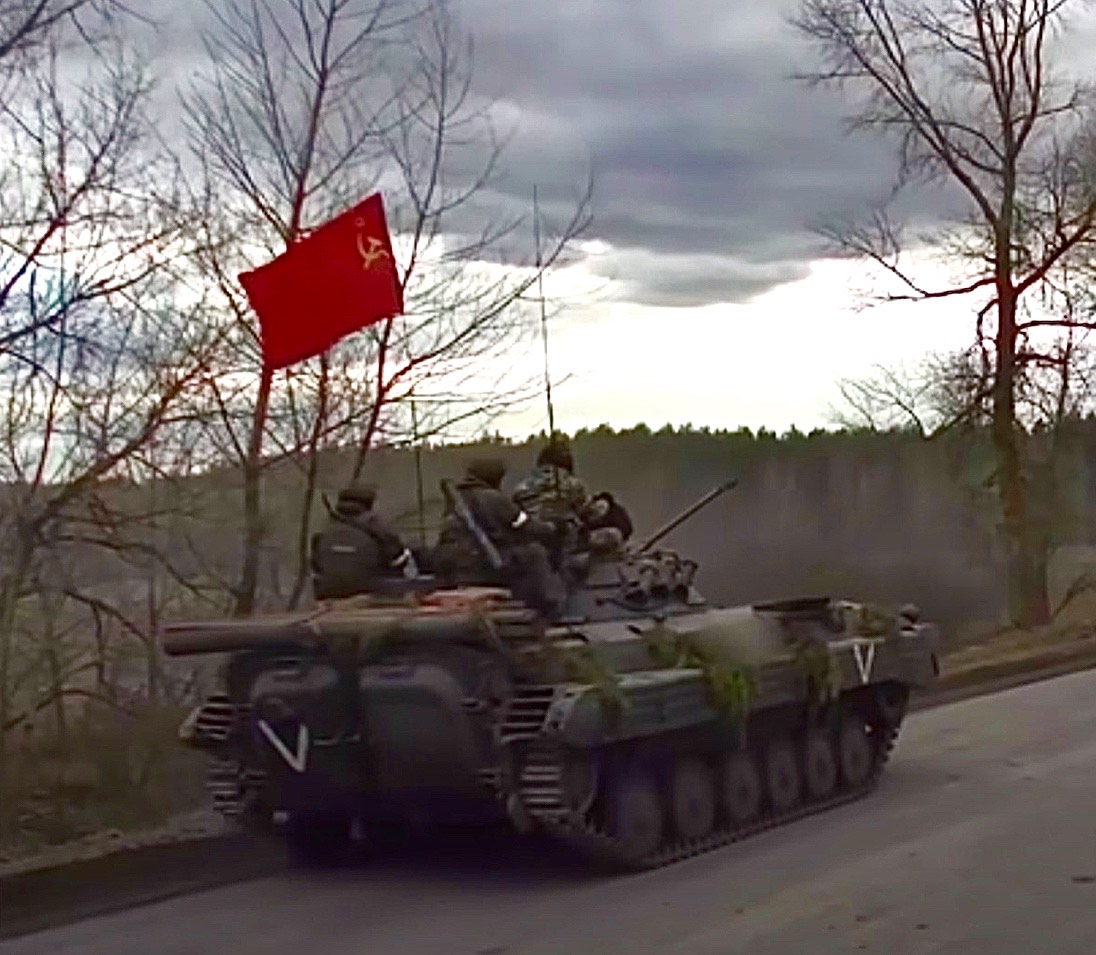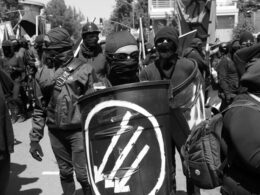There is an idea within the USA’s communist movement whose flawed reasoning is apparent when you look at our conditions from a dialectical standpoint, but which is getting promoted more as our revolutionary crisis intensifies. This is the idea that to succeed, communists must win over as many liberals as they can, even if this means adopting practices that we wouldn’t otherwise embrace. Practices such as minimizing the importance of class, minimizing the importance of fighting U.S. hegemony, and disavowing Russia’s war against Ukrainian fascism (which naturally doesn’t get defined as such within the framework of liberal appeasement).
Those three types of anti-Marxist activities are intertwined, they stem from the same core notion that gaining favor with the left gatekeepers of our organizing and discourse spaces is of utmost importance. So naturally when somebody engages in one of these habits, they’re inclined to engage in the others. They’re what’s necessary for gaining and maintaining access to the circles which define what’s considered “the left” in this country.
With the promotion of this notion comes the rejection of another notion, the one that Lenin came to after learning how a communist can win the people:
Engels draws a distinction between the “bourgeois labour party” of the old trade unions—the privileged minority—and the “lowest mass”, the real majority, and appeals to the latter, who are not infected by “bourgeois respectability”. This is the essence of Marxist tactics! Neither we nor anyone else can calculate precisely what portion of the proletariat is following and will follow the social-chauvinists and opportunists. This will be revealed only by the struggle, it will be definitely decided only by the socialist revolution. But we know for certain that the “defenders of the fatherland” in the imperialist war represent only a minority. And it is therefore our duty, if we wish to remain socialists to go down lower and deeper, to the real masses; this is the whole meaning and the whole purport of the struggle against opportunism. By exposing the fact that the opportunists and social-chauvinists are in reality betraying and selling the interests of the masses, that they are defending the temporary privileges of a minority of the workers, that they are the vehicles of bourgeois ideas and influences, that they are really allies and agents of the bourgeoisie, we teach the masses to appreciate their true political interests, to fight for socialism and for the revolution through all the long and painful vicissitudes of imperialist wars and imperialist armistices. The only Marxist line in the world labour movement is to explain to the masses the inevitability and necessity of breaking with opportunism, to educate them for revolution by waging a relentless struggle against opportunism, to utilise the experience of the war to expose, not conceal, the utter vileness of national-liberal labour politics.
With these statements, Lenin was implicitly warning us against the error which modern America’s “anything but class” leftists, anti-anti-imperialists, and “neither NATO nor Russia” Marxists are engaging in. This is the error of assuming that the privileged minority of the people, the facilitators of the “left” political spheres which are compatible with the bourgeois social order, represent the most important demographic for communists to win over. The foolishness of this conclusion is obvious, because how can you expect to win the class war when you’re trying to get the bourgeoisie’s controlled opposition on your side? The only version of communism these opportunists will ever accept is a “communism” that’s been robbed of what makes communism actually effective. Which has been rendered unable to bring the overthrow of the capitalist state.
I realize the ideological tendencies I referred to in the last paragraph are obscure to those who haven’t shared my unenviable experience of getting to know all the major strains of left opportunism. And my primary goal at this stage is to inform revolutionary organizers about the malign ideological actors who can manipulate them due to their good intentions, so I’ll elaborate on who these opportunists I’m talking about are. First there’s the anything but class leftists, a phrase that Parenti introduced. Parenti describes the foundations of the ABC left’s arguments as one of distracting from the factors which unite the working class, by dividing this class with endless labels:
Both orthodox social scientists and “left” ABC theorists treat the diverse social factions within the non-capitalist class as classes unto themselves; so they speak of a “blue-collar class,” a “professional class,” and the like. In doing so, they claim to be moving beyond a “reductionist,” Marxist dualistic model of classes. But what is more reductionist than to ignore the underlying dynamics of economic power and the conflict between capital and labor? What is more misleading than to treat occupational groups as autonomous classes, giving attention to every social group in capitalist society except the capitalist class itself, to every social conflict except class conflict? Both conventional and “left” ABC theorists have difficulty understanding that the creation of a managerial or technocratic social formation constitutes no basic change in the property relations of capitalism, no creation of new classes. Professionals and managers are not an autonomous class as such. Rather they are mental workers who live much better than most other employees but who still serve the accumulation process on behalf of corporate owners.
These opportunists can use any other variety of classifications to advance their mission of dividing the proletariat, of making it look like the proletariat can’t unify because different proletarians have irreconcilable interests. At the moment, race and ethnicity are the main points within this attempt at splintering the workers. This is shown by texts like Decolonization is not a metaphor, which asserts that Occupy was wrong for wanting to raise general working class living standards because supposedly the only way to empower nonwhites is by driving down the living standards of whites (including the ones exploited by the bourgeoisie). The same logic is applied on an international scale by dogmatists like the Maoist Third Worldists, who claim the U.S. working class is all or mostly a labor aristocracy and is therefore in antagonism with the interests of the workers of the neo-colonies.
Then there are the “anti-anti-imperialists,” as I feel is appropriate to call the types of commentators who only or mostly bring up U.S. imperialism when trying to discredit those who actually counter the empire’s narratives. The primary grievances of these actors has shifted over the years as the empire’s main propaganda target has switched between different countries. In 2018, they were attacking anti-imperialists for exposing the Syria gas attack hoaxes. Over the next several years, they began to moreso attack anti-imperialists for exposing the Xinjiang genocide hoax. Since Russia’s special operation began last year, they’ve been mainly going after those who challenge the idea that Russia was unprovoked.
It’s not even the neocons who’ve been at the center of these attack efforts. They’ve barely said anything about these anti-imperialist outlets and journalists, they don’t need to. Overwhelmingly the effort to represent anti-imperialists as genocide deniers, and to confront them with strawman arguments like “anti-Americanism is not an ideology,” has come from those who orient themselves as on “the left.” Every major “left-wing” source, from the Daily Beast to the Anarchist Library, has featured content intended to disrupt the efforts at fighting U.S. hegemony.
Yet as the class and geopolitical conflicts have escalated, it’s been revealed that the nature of this divide isn’t as simple as anti-NATO vs pro-NATO. There’s emerged an element among Marxists who take the stance of “neither NATO nor Russia,” claiming to oppose U.S. hegemony while showing that in practice, they’ll oppose some of the essential steps towards ending that hegemony. Steps like Russia’s war, which has accelerated the transition to multipolarity. That Z has let NATO expand into more countries hasn’t outweighed the larger shift in the global power balance that’s occurred throughout the last year or so. Z has prompted the Global South to side against Washington, while creating the conditions for the BRI’s advancement to be sped up. The war’s “benefits” for the empire have been internal, externally the empire’s influence has shrunk.
Within the context of this proxy war, and of the wider cold war that it’s part of, anti-Z Marxists are the ones who view the “defenders of the fatherland” as the foremost types to prioritize winning over. As they’ve adopted a stance that tries to reconcile the anti-imperialist position with the pro-imperialist position, which is the only way they’ll be able to please as many liberals as they want to.
They’ll succeed at getting a following among liberals, and may even get these liberals to read theory. But because this educational program won’t involve learning how to be a serious anti-imperialist, the organizing structure that comes from this won’t be what overthrows the state. Because if you try to tell a crowd of liberals that they need to back Russia, China, and imperialism’s other foils, you’ll inevitably have at least some of them turn against you. And within the analytical framework that certain types of U.S. communists are basing their practice off of, the worst possible thing would be to not maximize one’s liberal outreach.
What is this analytical framework? It’s the framework that says the further to the “left” somebody is, whatever that means, the more valuable they necessarily are to the revolution. Within this concept of what constitutes revolutionary potential, the liberals by default appear to be the ones who should be prioritized above all else. But the logic behind this concept ignores how much Russiagate has been able to turn the country’s left towards the neocon stance on foreign policy. When the left started getting told by the media that support for Russia is synonymous with being right-wing, the opportunists within the left—which there are many—solidified their alignment with the neocons when it came to Russia.
As the new cold war develops, this antagonism will increasingly extend to China as well, since China has already shown it in practice backs Russia against the United States. Another anti-imperialist power that these unreliable types of leftists find themselves in ideological opposition towards (whether or not they’re ready to admit it) is the DPRK, which has voiced explicit support for Operation Z. This is ironic, since the DPRK is viewed by these same types of American left opportunists as something useful to support. The issue is that whereas serious Marxists support China and the DPRK because they’re anti-imperialist countries, the less serious ones claim to “support” them because this can be viewed as trendy within some left spaces. As soon as these spaces turn against these countries, which gets more likely as people are forced to pick sides in the new cold war, this “support” will end.
To find the real masses, the types who join a movement not for aesthetics but out of desire to win the struggle, look for which types of people have gravitated towards the anti-NATO movement. Liberals have not been the most inclined to join this movement, especially not the most serious element of it which backs Z. Right-leaning types have been more reliable supporters of this struggle, by which I mean not the culture-war obsessed rightists or the fascists, but rather the libertarian-leaning element. The others who’ve been most receptive to anti-imperialist ideas are those who were previously apolitical, but have been gaining more of a consciousness due to hearing about this despicable proxy war. Those ones have only begun to be tapped into, and they constitute a bigger demographic than Democrats or Republicans.
The left opportunists rationalize excluding these individuals, even though they’re proving themselves compatible with the anti-imperialist struggle, because the left opportunists don’t view this struggle as the foremost priority. They usually view “anti-colonialism,” or rather their own anti-Leninist version of anti-colonialism, as the primary thing to focus on. Which shows how unserious they are. As when you think in terms of how a revolution develops, you see that colonialism, class, and our other domestic contradictions won’t be resolved until we’ve sufficiently beaten U.S. imperialism. U.S. imperialism is the primary global contradiction, the main obstacle we need to overcome during this stage if we want to defeat the American state. Any communist program that doesn’t put fighting imperialism at the height of its priorities is not a program we can use to win. It can only keep us trapped in the endless cycle of opportunism, chasing after liberals who don’t even care about the class struggle.
————————————————————————
If you appreciate my work, I hope you become a one-time or regular donor to my Patreon account. Like most of us, I’m feeling the economic pinch during late-stage capitalism, and I need money to keep fighting for a new system that works for all of us. Go to my Patreon here.








